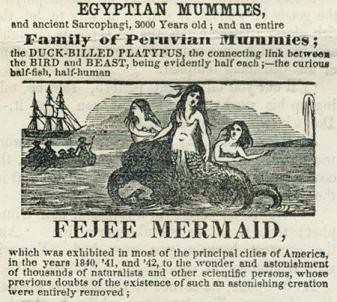Primary sources enable the researcher to get as close as possible to the truth of what actually happened during an historical event or time period. "Primary source" is a term used in a number of disciplines to describe source material that is closest to the person, information, period, or idea being studied. A primary source (also called "original source") is:
It serves as an original source of information about the topic. Similar definitions are used in library science, and other areas of scholarship. In journalism, a primary source can be a person with direct knowledge of a situation, or a document created by such a person. Primary sources are distinguished from secondary sources which cite, comment on, or build upon primary sources, though the distinction is not a sharp one.

Shadrach Minkins for sale in newspaper notice,1851.

An advert for P.T. Barnum's "Feejee Mermaid" in 1842 or thereabout.

The American actress Charlotte Cushman advertised in William Shakespeare's Hamlet at the Washington Theater in 1861.

Scene from Othello with Paul Robeson and Uta Hagen as Desdemona.